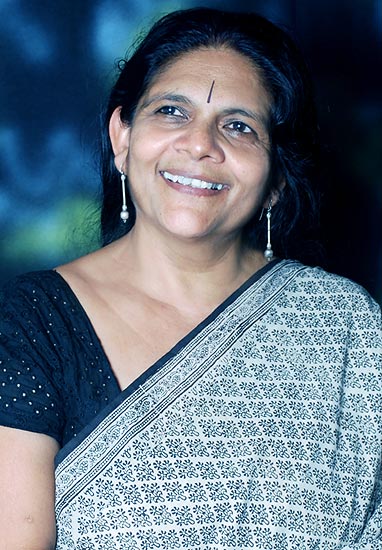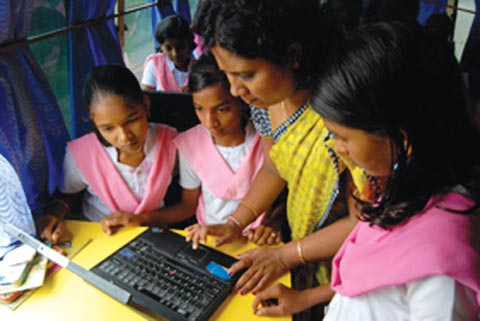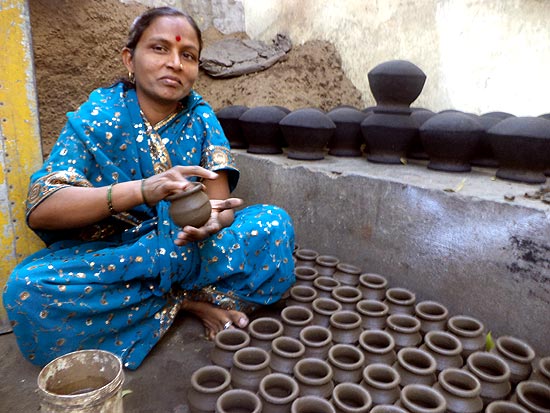Divya Nair
As part of a week-long series to celebrate women who have braved the odds, we speak to Chetna Sinha, CEO, founder of India's first rural bank for women.
A few days ago, when the finance minister announced his plan to promote and start India's first public sector bank for women as part of the nation's annual budget plan, it received much praise and attention.
Very few of us know the inspiring story of how India got it's first all-women bank in Satara in 1997.
Founded by Chetna Sinha, a brave farmer woman from Mhaswad, a small village in Satara, the Mann Deshi Mahila Bank has since worked to identify the problems of rural women and bettered the lives of over two lakh women in our country in ways you can't even imagine.
Here, rural entrepreneur and founder of Mann Deshi Bank, India's first rural bank for women, tells us why India needs more women-friendly banks at the rural level and how such banks will help improve the condition of women and provide them both financial and social independence.
Also, don't miss the inspiring stories of two women customers from the bank who braved the odds and achieved success in their own little way. Read on:
What according to you are the issues confronting women today?
Today, all over India, women face a common issue of law and order. Or the lack of it, to be more precise.
When law and order is not maintained, women feel ignored, and are caught in a vulnerable situation.In metros, the security of young women is of concern.
While charting plans for the growth of India, the rural sector is most often completely ignored and neglected.This discrimination has affected rural women. Even today, several women in rural areas and India's villages have to walk several kilometres in search of water.
These are some of the pressing issues I would like to highlight.
How in your opinion can we address these issues?
According to me, present-day women should have control on finance.
This is possible only if more and more mahila (women) banks come up.
I welcome the declaration by the finance minister for the promotion of banks for women.
How do you think women banks can improve the condition of women?In my experience of working with the Mann Deshi Mahila Bank, I have realised that the needs of women are different from men. So are their aspirations.
In every family, where the male member had control over the finances, we observed that one-third of the savings from earnings were spent on either buying a motorcycle or a vehicle.
When women had control, they usually saved money to spend it on house repairs and improving the condition of the family.
Younger women, on the other hand, saved to meet their higher education needs. This is exactly why I reiterate that merely providing access to financial services is not enough for women empowerment. They must have control too.
Most women we have met, also want to save enough before they opt for a loan.
But rural women don't have a fixed income or salary, yet they aspire to save and benefit. So, mahila banks have the additional responsibility of providing customised services to suit their needs and demands.Please click NEXT to continue reading how the rural bank has benefitted women...
'Several women in rural India want to start their own businesses'
Image: A teacher imparts computer education in a mobile classroomPhotographs: Mann Deshi Foundation
What are the qualities you admire in women?
Women across sectors have been making tireless efforts to improve their lives.
I have observed that women are good at multi-tasking.
For women, the satisfaction they receive from the work they do is more important than career building or anything else.
Women are good at organisation building. When women start to work, or think about any project, they put their heart and soul into making it a success.
In your experience of working with rural women, what is the one change you feel proud about?
In rural India, several women are coming forward wanting to start their own businesses.
Some have already started agro-businesses. This, in my opinion, is the first step towards self-employment and entrepreneurship.
Click NEXT to read about the inspiring lives of two rural women who benefitted from the women's bank...
'Anita wants her children to choose their own professions'
Image: Anita Bharat KumbharChetna Sinha also shared two case studies of women from her village, who in her opinion, have not only led inspiring lives, but also have an interesting message for our readers...
Rukmini Ashok More, 55
Educated up to the eighth standard, Rukmini started her career by working as a housemaid and simultaneously completed her graduation.
After gaining her degree, she gave up her job to work in a clinic in Satara as an assistant nurse. However, her meagre income as a nurse wasn't enough to make ends meet. That didn't deter this brave lady. With her savings she purchased a mobile stall and sold snack items like vada pav and bhajiyas outside student hostels.
Through the venture, she has been successful in owning and operating a snack shop for the last 18 years. Rukmini, who also makes paper bags, now dreams of sending her grandson to an English medium school.
After a lifelong struggle, Rukmini now boasts of a monthly income of Rs 5,000, which for a rural woman, who had little family support, is a commendable feat.
Anita Bharat Kumbhar, 35
A potter by caste, Anita was married at a very young age. Although she had learned pottery, she did not want to pursue the profession.
Soon, she realised, that since pottery promised year-round business, it was the only route she could afford, if she wished to support her family financially.
Interestingly, at the Mann Deshi Mahotsav 2012, Anita's stall was the most popular stall.
At the fair, she earned nearly Rs 2,000, every day, with which, she not only repaid her loan, but also saved some for the education of her children.
Anita says that she does not want her children to take up a profession by caste.
She is working hard as she wants them to choose their own professions when they grow up.
Dear readers, do you know a woman who braved the odds and built a successful life and career? How did they overcome the challenges and what is their secret to success? To share their inspiring stories, write in to us at getahead@rediff.co.in (subject line: Inspiring Women) along with a photograph if possible and we will publish the best responses right here!




Comment
article